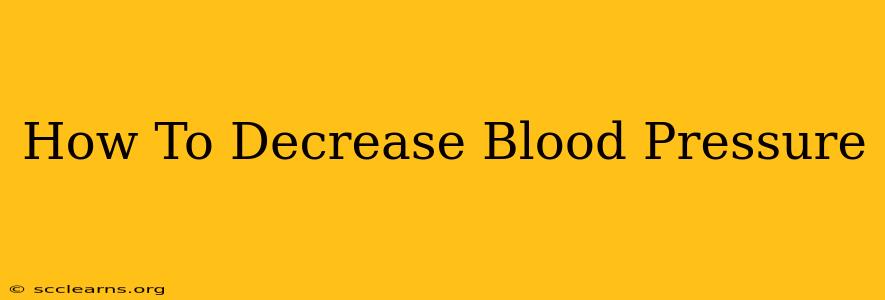High blood pressure, or hypertension, is a silent killer affecting millions worldwide. It significantly increases your risk of heart disease, stroke, and kidney failure. Fortunately, you can take control of your blood pressure through lifestyle changes and, in some cases, medication. This comprehensive guide explores effective strategies to naturally decrease your blood pressure and improve your overall health.
Understanding Blood Pressure
Before diving into solutions, let's understand what blood pressure is. It's the force of your blood pushing against the walls of your arteries. It's measured in two numbers: systolic (the top number) and diastolic (the bottom number). High blood pressure is generally defined as a reading consistently above 140/90 mmHg.
Lifestyle Changes to Decrease Blood Pressure
The good news is that many lifestyle modifications can significantly impact your blood pressure. These changes not only lower your blood pressure but also improve your overall well-being.
1. Diet Plays a Crucial Role
What to Eat:
- Fruits and vegetables: Packed with essential nutrients and fiber, these are crucial for heart health. Aim for at least five servings a day.
- Whole grains: Choose whole-wheat bread, brown rice, and oats over refined grains.
- Lean protein: Opt for fish, poultry, beans, and lentils.
- Healthy fats: Incorporate avocados, nuts, and olive oil into your diet.
What to Avoid:
- Processed foods: High in sodium, unhealthy fats, and added sugars, these should be limited.
- Red meat: Consume sparingly due to its high saturated fat content.
- Excessive sodium: Reduce your salt intake to lower your blood pressure. Read food labels carefully.
- Sugary drinks: These contribute to weight gain and can negatively impact blood pressure.
2. Exercise Regularly
Regular physical activity is essential for lowering blood pressure. Aim for at least 150 minutes of moderate-intensity aerobic exercise or 75 minutes of vigorous-intensity aerobic exercise per week. This could include brisk walking, jogging, swimming, or cycling. Even short bursts of activity throughout the day can make a difference.
3. Manage Stress Effectively
Chronic stress elevates blood pressure. Find healthy ways to manage stress, such as:
- Meditation: Practice mindfulness and relaxation techniques.
- Yoga: Combines physical postures, breathing techniques, and meditation.
- Deep breathing exercises: A simple yet effective way to calm your nerves.
- Spending time in nature: Reconnect with the outdoors and enjoy its calming effects.
4. Maintain a Healthy Weight
Being overweight or obese significantly increases your risk of high blood pressure. Losing even a small amount of weight can have a positive impact. Combine a healthy diet with regular exercise for optimal weight management.
5. Limit Alcohol Consumption
Excessive alcohol consumption raises blood pressure. If you drink alcohol, do so in moderation. For men, that's up to two drinks per day, and for women, it's up to one drink per day.
6. Get Enough Sleep
Aim for 7-8 hours of quality sleep each night. Lack of sleep can disrupt your body's natural rhythms and negatively affect your blood pressure.
7. Quit Smoking
Smoking damages blood vessels and increases your risk of high blood pressure. Quitting smoking is one of the best things you can do for your heart health.
When to See a Doctor
While lifestyle changes are often effective, it's crucial to consult your doctor if you have high blood pressure. They can monitor your blood pressure, identify underlying causes, and recommend appropriate treatment, which may include medication. Never self-treat high blood pressure.
Conclusion
Decreasing blood pressure naturally requires commitment and consistency. By adopting these lifestyle changes, you can significantly reduce your risk of serious health complications and improve your overall quality of life. Remember to consult your healthcare provider for personalized advice and monitoring. Taking proactive steps towards better health is an investment in a longer, healthier life.

